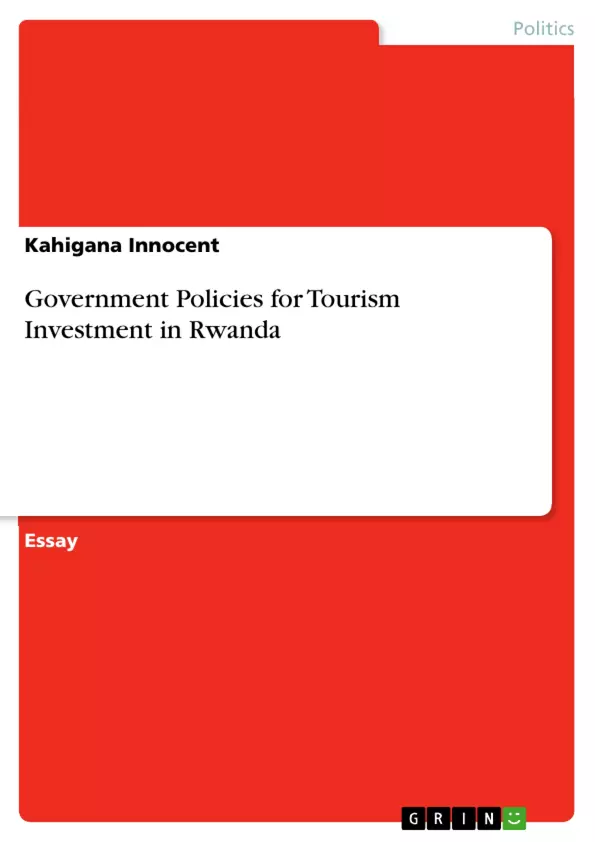The success of tourism industry relies more on the government policies that influence private investment to take a lead in Rwanda.
Despite the intended support by the government policies, some challenges were identified to hamper private investment in the tourism sector. Among them: increase in prices of private land; costly privately conducted EIA; shortage of funds and human resource capacity gap at local government levels; uncertain synergy among private sector and local communities in joint tourism ventures.
There is the need to make improvements in these policies to facilitate private investment in tourism sector in Rwanda.
Inhaltsverzeichnis (Table of Contents)
- INTRODUCTION
- Study background
- Research question
- Sub-questions
- LITERATURE REVIEW
- RESEARCH METHODOLOGY
- STUDY FINDINGS
Zielsetzung und Themenschwerpunkte (Objectives and Key Themes)
This research investigates the impact of government policies on private investment in the tourism industry in Rwanda. The study focuses on how specific policies, such as land allocation, decentralization, and environmental protection, influence the ability of private investors to secure land, implement investment plans, and foster sustainable tourism development.
- The influence of land policy on private investment in tourism.
- The role of environmental policy in facilitating sustainable tourism development.
- The impact of decentralization policy on local government support for tourism investment.
- The effectiveness of tourism policy in promoting public-private partnerships and attracting investment.
- The challenges and opportunities related to private investment in Rwanda's tourism sector.
Zusammenfassung der Kapitel (Chapter Summaries)
The introduction provides background information on the significance of tourism to socioeconomic development and the role of government policies in supporting private investment. The research question and sub-questions are presented, outlining the scope of the study. The literature review examines relevant theories and existing research on the relationship between government policies and private investment in tourism, focusing on land use, public trust, fiscal federalism, and dependency theories. The research methodology section describes the qualitative approach employed, including desk research and interviews with private sector members and local government officials. The study findings analyze the impact of specific policies on private investment, including land policy, environmental policy, decentralization policy, and tourism policy.
Schlüsselwörter (Keywords)
The primary keywords and focus topics of this research include private investment, tourism, government policies, land allocation, decentralization, environmental protection, sustainable tourism development, Rwanda.
Frequently Asked Questions
What is the objective of the research on Rwandan tourism?
The research investigates how Rwandan government policies influence private investment in the tourism sector, focusing on challenges and potential improvements.
What are the main challenges for private investors in Rwanda's tourism?
Key challenges include high land prices, costly Environmental Impact Assessments (EIA), funding shortages, and human resource gaps at the local government level.
How does decentralization affect tourism investment?
The study examines whether decentralization helps or hinders local government support for investors and identifies capacity gaps that need to be addressed.
What role does land policy play in tourism?
Land allocation policies are crucial for private investors to secure property and implement long-term investment plans for hotels and attractions.
What is the methodology used in this study?
The study uses a qualitative approach, including desk research and interviews with private sector members and local government officials.
- Quote paper
- Kahigana Innocent (Author), 2016, Government Policies for Tourism Investment in Rwanda, Munich, GRIN Verlag, https://www.grin.com/document/333776



